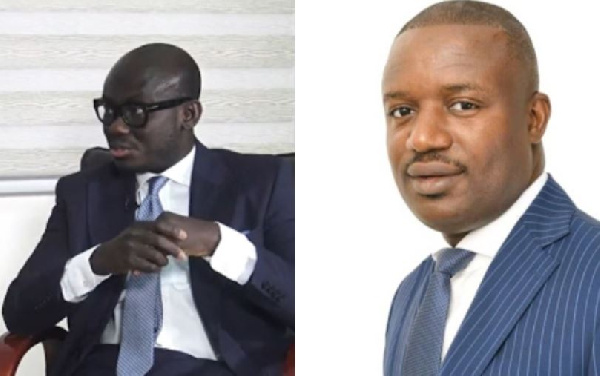GENERAL
Blame game over £170 million judgement debt as Mahama, Akufo-Addo appointees clash.
Published
4 years agoon
By
Joe Pee
Ghana, the country which in the words of the venerable Sir Sam Jonah has its youth ‘suffocating under huge debt’ has incurred a further £170million for wrongfully terminating a power purchasing agreement it had with the Ghana Power Generation Company, GPGC.
A London-based United Nations Commission on International Trade Tribunal on June 8, 2021 awarded in excess of £170 million to the company after Ghana failed to take advantage of a window for appeal.
The ruling has set the country ablaze with members of the previous and current governments having a go at each other.
While taxpayers lament the costly error that landed the nation another judgement debt, political figures have turned into a game with either side focused on blaming the other.
Godfred Dame, the Attorney-General and Minister of Justice threw the first punch, blaming the erstwhile Mahama government for signing the deal in the first place.
Dame’s position stems from the fact that the deal was signed by the former government as one of many power agreement entered into by the then government to address the energy crisis known popularly as ‘dumsor.’
The AG disclosed that he had tasked the Criminal Investigations Department of the Ghana Police Service to investigate the deal and prosecute anyone found culpable.
“Irrespective of whether it was terminated before it became effective or not, the government was exposed to financial loss,” he said.
“So I think that when it comes to financial loss, it is so clear in my mind that the responsibility lies clearly with those who entered into the agreement. The basic point is that the entry into this transaction was unnecessary. The entry into this transaction was what resulted in financial loss to the state.
“I, on account of all of this, I’m going to write a formal complaint requesting an enquiry by the CID into the conduct of the public officers who acted in the manner which resulted in the signing of an agreement which resulted in financial loss to the state, ” Mr Dame said.
In sharp response, John Jinapor, a deputy Energy Minister under the Mahama administration, gave friendly political advice to Dame.
He said “You [Godfred Yeboah-Dame] can choose to threaten us. You can choose to behave in any way you want because you’re the Attorney General. But let me put this on record for you. You will not be Attorney General forever.
“So please, these issues of John Jinapor. John Jinapor would not help your matter. You advised the Minister to terminate against the committee’s recommendation.”
Hopeson Adorye, a leading member of the NPP on Okay FM said that Ghanaians should be grateful to the NPP government for saving the state.
He noted that but for abrogation of the GPGC contract and other PPA deals, Ghana would have been in serious debt.
But this view is contested by Kofi Armah-Buah who served as minister for Energy and Petroleum. He is of the view that the debt was incurred by the actions of the current government.
“How did this come about? The GPGC emergency power agreement was signed in July 2015, it had cabinet and parliamentary approval. The termination of the agreement leading to the tribunal award took place in 2018 under the current government. This was after Ghana’s failure to properly defend the case in court.
“I have heard the Attorney General’s hasty threats of investigation and prosecution. It is important to fairly study the events leading to the termination and how as a country we defended this case in court”.
Other officials who have offered divergent views on the matter include Kwabena Donkor, a former Power Minister.
Kwabena Donkor said: “I am a law-abiding Ghanaian. If the CID says they want to investigate something, what do I have to hide? I will go to the CID. This is not the first time I have been called to the CID.”
Boakye Agyarko, the minister under whose tenure the deal was truncated has said that the opposition party has no moral right to speak on the issue as they brought in the deal in the first place.
“We have paid almost over $1 billion for excess capacity. The review committee estimated that the contract as they were if they were allowed to stand, the country will be paying at the end of the 13th year $7.2 billion in excess capacity charges.
“Now if the country is going to be saddled with $7.2 billion for excess capacity, we needed to rethink. In the PPA review, what it said was that if we could get the termination and the management of all the excess capacity, the liability that we will be faced with is about $600 million out of pocket.”
He continued: “Now, $600 million in year one compared to $7.2 billion, now even if you do the next present value calculation and bring the $7.2 billion into a one-year payment, we are still better off. I don’t understand why the people whose time these excess capacity contracts were signed now have the guts and the audacity to accuse people who are trying to manage the mess they created,” he told Accra-based Citi FM.
You may like
-


Video: Nana Tonardo Sprays Cash on Nana Agradaa During Church Visit
-


Juliet Ibrahim Champions Gender Equality with HER STEAM Initiative
-


Video: Funny Face Flees After Learning Lady Shares Name with His Ex
-


Video: Lisa Quama Revives Ghana’s Independence Spirit with Stirring Nkrumah Reenactment
-


Tiwa Savage Eyes Mogul Status with Bold Plans for Music and Film Industry Expansion
-


The 28th February Crossroads Shooting: The Spark That Ignited Ghana’s Independence
-


Mahama Vows to Usher in Era of Fiscal Discipline and National Renewal
-


Elon Musk changes his name to Kekius Maximus on X
-


Mahama Calls for Unity Among Political Parties to Drive Ghana’s Renaissance
















